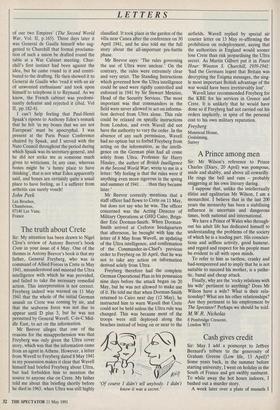The truth about Crete
Sir: My attention has been drawn to Nigel Clive's review of Antony Beevor's book Crete in your issue of 4 May. One of the themes in Antony Beevor's book is that my father, General Freyberg, who was in command of Allied Forces in Crete in May 1941, misunderstood and misread the Ultra intelligence with which he was provided, and failed to take the necessary remedial action. This interpretation is not correct. Freyberg indeed was warned on 11 May 1941 that the whole of the initial German assault on Crete was coming by air, and that the seaborne force was not due to appear until D plus 3, but he was not permitted by General Wavell, C-in-C Mid- dle East, to act on the information.
Mr Beevor alleges that one of the reasons for the misapprehension was that Freyberg was only given the Ultra cover story, which was that the information came from an agent in Athens. However, a letter from Wavell to Freyberg dated 8 May 1941 in my possession makes it clear that Wavell himself had briefed Freyberg about Ultra, but had forbidden him to mention the source to anyone else on Crete. My father told me about this briefing shortly before he died in 1963, when Ultra was still highly classified. It took place in the garden of the villa near Canea after the conference on 30 April 1941, and he also told me the full story about the all-important pre-battle phase.
Mr Beevor says: 'The rules governing the use of Ultra were unclear.' On the contrary, the rules were extremely clear and very strict. The Standing Instructions which governed how the Ultra intelligence could be used were rigidly controlled and enforced in 1941 by Sir Stewart Menzies, Head of the Security Services. The most important was that commanders in the field were never allowed to act on informa- tion derived from Ultra alone. This rule could be relaxed on specific instructions from London, and even Wavell did not have the authority to vary the order. In the absence of any such permission, Wavell had no option but to forbid Freyberg from acting on the information, as the intelli- gence on the German plan had all come solely from Ultra. Professor Sir Harry Hinsley, the author of British Intelligence in the Second World War, wrote to me in a letter: 'My feeling is that the rules were if anything even more rigorous in the spring and summer of 1941 . . . than they became later.'
Mr Beevor correctly mentions that a staff officer had flown to Crete on 11 May, but does not say who he was. The officer concerned was the Acting Director of Military Operations at GHQ Cairo, Briga- dier Eric Dorman-Smith. When Dorman- Smith arrived at Creforce headquarters that afternoon, he brought with him the letter of 8 May from Wavell, an updating of the Ultra intelligence, and confirmation of the Commander-in-Chiefs previous order to Freyberg on 30 April, that he was not to take any action on information derived solely from Ultra.
Freyberg therefore had the complete German Operational Plan in his possession nine days before the attack began on 20 May, but he was not allowed to make use of it. He told me that when Dorman-Smith returned to Cairo next day (12 May), he instructed him to warn Wavell that Crete could not be held unless the Ultra rule was changed. This was because most of the troops were still deployed along the beaches instead of being on or near to the 'Of course I didn't tell anybody. I didn't know it was a secret.' airfields. Wavell replied by special air courier letter on 13 May re-affirming the prohibition on redeployment, saying that the authorities in England would sooner lose Crete than risk jeopardising the Ultra secret. As Martin Gilbert put it in Finest Hour: Winston S. Churchill, 1939-1941: tad the Germans learnt that Britain was decrypting the Enigma messages, the sing- le most important British advantage of the war would have been irretrievably lost'.
Wavell later recommended Freyberg for the KBE for his services in Greece and Crete. It is unlikely that he would have done so if Freyberg had not carried out his orders implicitly, in spite of the personal cost to his own military reputation.
Freyberg
Munstead House, Godalming, Surrey


























































 Previous page
Previous page